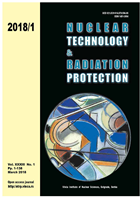
SEASONAL VARIATION OF INDOOR AND OUTDOOR GAMMA DOSE RATES OF REASI DISTRICT OF JAMMU AND KASHMIR
Pages: 106-111
Authors: Manpreet Kaur, Ajay Kumar, Rohit Mehra, and Rosaline MishraAbstract
In the present study, the indoor gamma dose rate has been studied seasonally and the outdoor gamma dose rate was also measured in and around the 24 dwellings of 10 villages of Reasi district of Jammu and Kashmir, India, at about one meter above the ground surfaces by using Dosimeter-Radiometer MKS-03 (SARAD). The study was carried out to assess the annual equivalent dose rate for the inhabitants of the dwellings. The survey was designed in such a way so as to obtain a uniform and representative distribution of measurements locations. The indoor to outdoor dose ratio was calculated as 1.8, which indicated that the indoor gamma dose rate as compared to outdoor gamma dose rate has elevated levels of radon exposure due to confined space and poor ventilation. The average indoor gamma dose rate for three seasons such as winter, summer, and rainy were 0.18 ± 0.02, 0.12 ± 0.03, and 0.15 ± 0.03 µSvh-1, respectively. It was observed that the indoor gamma dose rate during the winter season is higher than those for rainy and summer seasons. The indoor and outdoor annual equivalent dose rate was also measured from the health hazard point of view and it varied from 771 ± 210 to 1402 ± 280 µSvy-1 and 105 ± 53 to 315 ± 105 µSvy-1. These results revealed that the outdoor equivalent dose rate levels in all of the locations were below the 1000 µSvy-1 maximum permissible limit for the public set by International Commission on Radiological Protection, except the few locations of indoor equivalent dose rate.
Key words: indoor and outdoor gamma exposure, dosimeter-radiometer, equivalent dose rate,
seasonally variation
FULL PAPER IN PDF FORMAT (671 KB)
